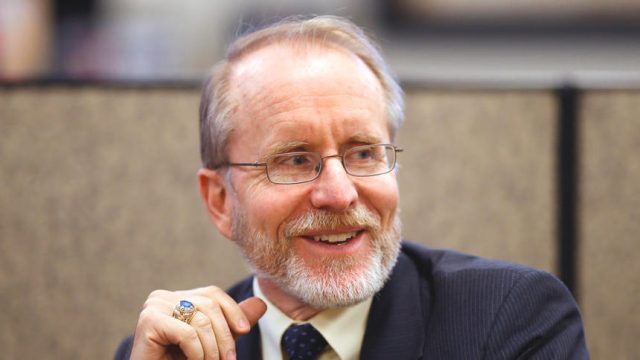University System Should Get Open Records Exemption for President Applications

FILE PHOTO: Chancellor Mark Hagerott of the North Dakota University System. ( Eric Hylden/Grand Forks Herald)
Over the years of writing this blog I developed something of a reputation as a strong supporter of open records and open meetings.
So when the North Dakota University System – an organization with an unfortunate history of violating our state’s transparency laws – began making noises about getting an exemption from the state’s open records laws for university system applicants my first impulse was to oppose it.
What the university wants to exempt all but the final round of university president applicants from open records requests. After the last several years in which our university system, and some of the university system presidents themselves, have flouted open records laws my thought was that we shouldn’t be rewarding these people.
But I’ve come around on the issue. Chancellor Mark Hagerott says he intends to ask the Legislature for an exemption, and I think he should get it:
How the law currently reads discourages strong applicants from applying because having their names publicized could jeopardize their current jobs and hurt their chances when they apply for other jobs, Hagerott said.
When applicants’ names are released, people can search their names on the internet—or get a Google alert sent to their inboxes—and know about it within minutes, Hagerott said. That can follow applicants for years if they do not end up getting the job.
“Someone outside sees a Google alert and says ‘There must be something wrong with them,’ when in reality it was just the wrong fit,” Hagerott said.
Why did I change my mind? Our state’s on-going problems with arrogant and uncooperative university presidents is what made me think that a change to the law is warranted. The University of North Dakota was not well served by former President Robert Kelly who left under a cloud of discontent among faculty and students. Minot State University and Williston State College also suffered from poor leadership under former presidents David Fuller and Ray Nadolny.
And who could forget former Dickinson State University President Richard McCallum, a man who turned that institution into a diploma mill which issued hundreds of phony degrees? That four-year institution is still on life support trying to recover from that scandal to this day.
North Dakota State University is currently languishing under the administration of yet another bad hire in President Dean Bresciani, a man who is more than likely already on his way out after recent scandals.
[mks_pullquote align=”right” width=”300″ size=”24″ bg_color=”#ffffff” txt_color=”#000000″]It shouldn’t be lost on us that a lot of the problems in North Dakota’s university system over the years seem to have, as their epicenter, poor leadership at the university level.[/mks_pullquote]
It shouldn’t be lost on us that a lot of the problems in North Dakota’s university system over the years seem to have, as their epicenter, poor leadership at the university level. So maybe we need a change to the way that leadership is chosen.
That Hagerott, SBHE President Kathy Neset, and former Governor Ed Schafer are all advocating this position is also compelling. I have a lot of respect for their judgment.
But to get this change in the law I think the university system needs to meet some conditions.
First, they need to make it absolutely clear that past sins against transparency laws have been corrected and will not be repeated. A good start in this regard would be firing Bresciani whose epic battles with the Legislature over records requests have contributed in no small way to the lack of trust many lawmakers and state officials feel toward his institution. Perhaps Hagerott could describe for us, in making his case for this proposed legislation, what other steps (hopefully in addition to canning Bresciani) he and the SBHE have taken to promote transparency and to hold accountable those under his administration who flout the law.
Second, the university system needs to remember that the open records exemptions stop here. The case for exempting the hiring process around such a heavily scrutinized position as university president may be compelling, even to this open records hardliner, but it’s still a big ask. Other requests for exemptions from transparency laws are likely to fall flat, as well they should.
Third, if this initiative succeeds it will be because a majority of lawmakers feel a level of trust in current university system leadership that they haven’t felt with past leadership. Hagerott and the SBHE need to be cognizant of this, and not squander the good will.
Fourth, if this law passes the NDUS had better do a better job of hiring university presidents. Because they’ve signed us up for some real stinkers in the past.




